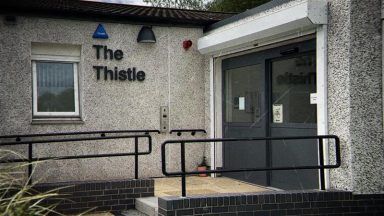Campaigners say reforms to the law on disclosing convictions will help more people into work and reduce crime rates.
From next week the length of time people need to reveal prison sentences or community payback orders to potential employers is being reduced.
Anyone sentenced to 12 months in prison will only have to reveal it for three years rather than ten.
Community payback orders will be cut from five years to 12 months or the length of the order.
The law for more serious crimes with prison sentences above four years will not be changed.
Gerry Keogh struggled to find work after his release from prison for credit card theft.
He said: “The rejection was horrendous. It was constant, it was just constant.”
“You can see interviewers faces drop straight away, so I’ve dealt with that quite a few times, and I’m not saying it’s about feeling sorry for me, it’s not about that.
Gerry now works for Unlock Employment helping people find work.
“I think it’s really about changing attitudes and understanding about people that need second chances because that’s what it’s all about for me. It’s about somebody getting a second chance.”
‘It’s about somebody getting a second chance.’
Gerry Keogh, Unlock Employment
Justice secretary Humza Yousaf told STV News: “The disclosure period is linked to the sentence or the length of sentence that you have.
“All we have done is reduce that slightly but it’s not gone completely. It does match and correspond with the length of sentence which often is a good indicator of the seriousness of the crime.”
Charities helping people navigate support services believe the reforms will also help employers, particularly during the pandemic when applications far outweigh vacancies.
Maria Ferrari from homeless charity Cyrenians said: “Filtering through that and trying to find the best person for the job can feel quite difficult.
“Now they’re going to have so much more choice, more diversity and more experience and from an employer point of view that’s a really important thing.
“They want to have the best person for the job and this is going to open up a whole different lot of people.”
The reforms mean more people will have the right to decide whether to disclose their background.
Grace Chocolates Changing Lives supports women who have been through the criminal justice system back into employment.
Chief executive Joyce Murray said: “It’s about being open and honest and this is who I am.
“We all make mistakes in life and if the woman is comfortable accepting where she is at, she may choose to say no I want to have a confidential conversation with the employer so there is no risk of information coming out at some other point, that they would be much more comfortable being up front and honest at the start and disclosing what their background is and we would help and support them to do that.”
Disclosure rules for occupations like teaching or medicine will not be altered.
Dughall Laing of Recruit With Conviction, which supports employers and employability agencies in the recruitment of people with criminal records, said: “Employers will still be able to carry out these checks, it’s just that the time periods involved will differ.
“These time periods that are involved really do hold people back from employment, and actually it is no bearing on whether they are likely to commit any offences in employment or during their private life.”
Follow STV News on WhatsApp
Scan the QR code on your mobile device for all the latest news from around the country























